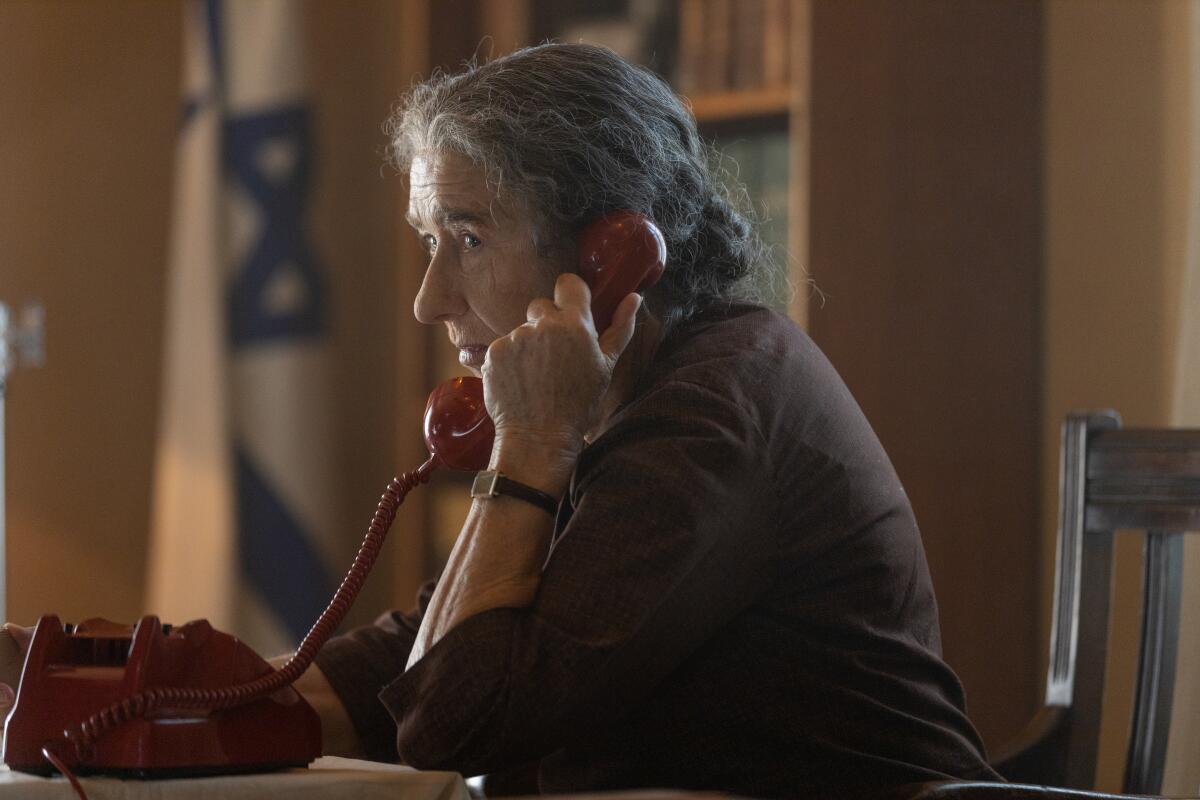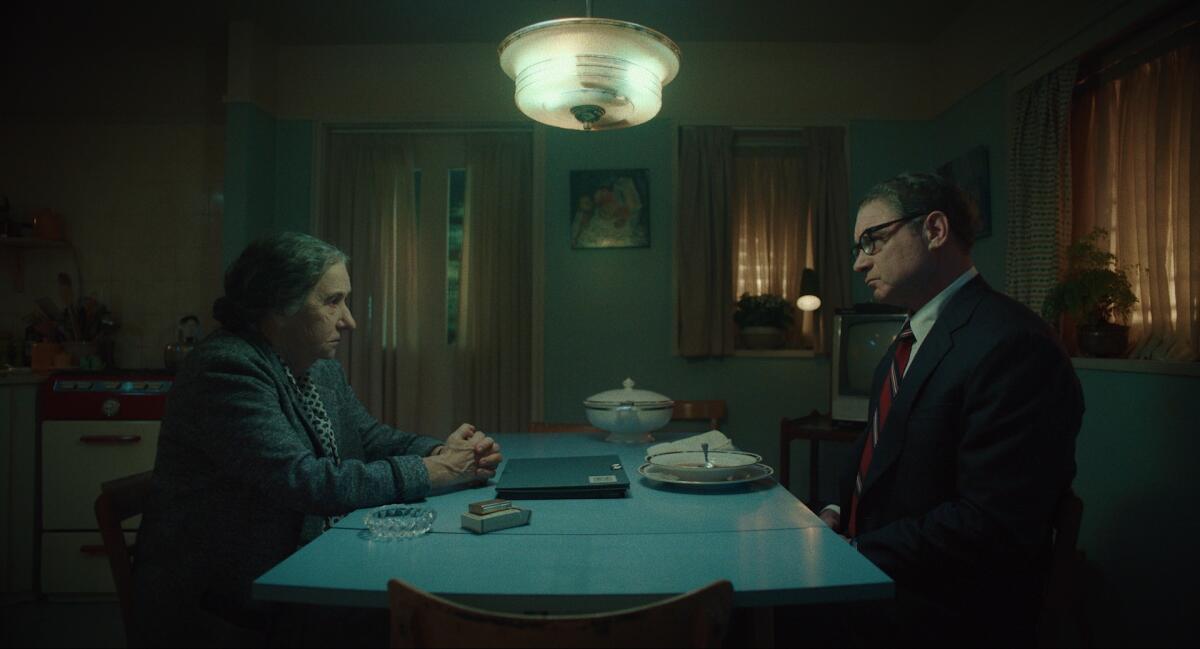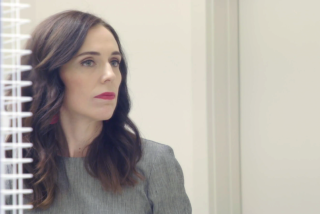Helen Mirren shines (and smokes) in an otherwise lackluster ‘Golda’

- Share via
The first time you see Helen Mirren as the Israeli Prime Minister Golda Meir, she comes at you in stern little fragments: a puckered mouth taking a long, slow drag on a cigarette (one of many), then the back of a head, the hair pulled back in a severe bun. “Golda,” a title card declares over a closeup of two thick-browed eyes. It’s like watching an illusion come together slowly, piece by piece, in a movie that all but dares you to see the great actor hidden beneath the meticulously applied wrinkles. The last time Mirren played a world leader on the big screen, in “The Queen,” she reminded us that heavy lies the head that wears the crown. In “Golda,” apparently, no less heavy lies the head that wears layers upon layers of prosthetic pancake.
Directed by the Israeli American filmmaker Guy Nattiv (“Skin”) from a script by the English screenwriter Nicholas Martin (“Florence Foster Jenkins”), “Golda” purports to track the bloody events of October 1973, when Egyptian and Syrian forces, armed with Soviet-supplied weapons, mounted a surprise attack on Israel on the holiest day of its calendar. Through this harrowing 18-day conflict, known as the Yom Kippur War, the movie also seeks to illuminate the indomitable spirit of a leader who steered her young nation, imperfectly but with great courage, through failures of intelligence, crises of political conscience and thousands of military casualties.
Really, though, “Golda” isn’t about any of these things. It’s much more about Mirren’s anxious but determined gait as her Golda enters a room full of distracted male colleagues, or strides across a Tel Aviv rooftop to be alone with her thoughts and have another smoke. It’s about all the vividly cinematic ways she can wield a cigarette, as both a signifier of defiance (she’s dying, slowly, of cancer) and an emblem of personal style. It’s about all the external details, those fleeting but eminently exploitable points of contact between Mirren’s brilliance as a performer and Meir’s brilliance as a leader. “Golda” feeds that time-honored tradition of watching a virtuoso screen performer vanish behind a famous name and a wall of cinematic artifice.
Hoary as it can be, the practice still reliably wows audiences and awards voters, as recent-ish Oscar winners like Jessica Chastain, Renée Zellweger, Rami Malek and Gary Oldman can attest. Lately, though, the tradition has also taken on some critical and culturally specific baggage, some of it tied to the forthcoming, much-buzzed biopic “Maestro,” in which a non-Jewish actor, Bradley Cooper, dons a fake schnoz to play a Jewish celebrity, Leonard Bernstein. “Golda,” arriving with far less fanfare in theaters this week, has been caught up in a quieter version of the same controversy.
The “should only Jews play Jews?” debate won’t be revived here, much less resolved. Suffice to say that if this is artifice, then it is artifice of a very high caliber. As the sickly, septuagenarian Meir, Mirren packs fierce authority, grandmotherly warmth, touching uncertainty and wry resignation into an uncharacteristically stooped and heavily padded frame. (She also suggests, with her distinctly American intonations, a hint of Golda’s hardscrabble Milwaukee upbringing.) Her performance, far from being the movie’s greatest drawback, is the best and perhaps only interesting thing about it.

The more glaring problem is that “Golda” itself never rises above the level of an actor’s showcase, never achieves — despite some noticeable effort — a more complicated, challenging reading of history. An expository prologue doesn’t inspire confidence; moving from Israel’s founding in 1948 to its triumph over its Arab neighbors in the Six-Day War of 1967, it plows through roughly two decades of tumultuous history with all the verve of an awards show highlights reel. Equally perfunctory is a framing device set in January 1974, as unsmiling members of the Agranat Commission grill Meir about the intelligence failures that precipitated the surprise Yom Kippur attack months earlier.
The movie’s account of those failures — but also the failures of Egypt and Syria, which seize but cannot maintain the upper hand — is appreciably absorbing, even if the war itself, waged on two fronts on the Sinai Peninsula and in the Golan Heights, is kept largely hidden from view. It thus falls to the swift, fluid movements of Jasper Wolf’s camera and the suspenseful thrum of Dascha Dauenhauer’s score to bring this rickety war room procedural to life. The tension is heightened by the steady clacking of typewriter keys and, from time to time, the soldiers’ screams we hear being transmitted from the battlefront, screams that lodge indelibly in Meir’s memory and give the life-and-death stakes an insistently human voice.
Her concern for her people could scarcely be more palpable; watch how Mirren softens Golda’s face and posture in the presence of her secretary, whose ill-fated soldier son becomes a convenient stand-in for thousands of other young men on the front lines. But her natural empathy turns out to be the flip side of her utter ruthlessness as a tactician and negotiator. You see that mix of vulnerability and steel at play as Golda submits to lymphoma treatments, furiously chain-smoking through every one. You also see it in her compassionate yet highly strategic dealings with her closest colleagues (played by actors including Lior Ashkenazi, Dvir Benedek and Rami Heuberger), whose occasional lapses of judgment and failures of nerve provide ample opportunity for Golda to step in and do what she can to redeem an impossible situation.
She can only do so much, of course, since she, like the state she governs, operates at the behest of bigger, more powerful geopolitical entities. Martin’s script acknowledges the fragile, conditional nature of Israel’s alliance with the U.S., especially given the latter’s newfound reliance on Middle East oil imports. That gives rise to a few juicily entertaining scenes involving U.S. Secretary of State Henry Kissinger (a guarded Liev Schreiber), who emerges as Meir’s most significant ally and sparring partner. She is never more fully at the peak of her negotiating powers than when Kissinger briefly passes through Tel Aviv, where she forces him to consume a bowl of borscht and offer Israel some badly needed reinforcements.
Given the deliberate narrowness of the movie’s perspective, it makes sense that Kissinger should be presented solely in terms of his significance to Israel. But if the more troubling aspects of his own legacy are left pointedly off-screen, so is a deeper, longer view of the Arab-Israeli conflict, the hard lessons of the Yom Kippur War and the anguish that Israel would both endure and inflict in the decades to follow. The movie opens with an on-screen acknowledgment of Israel’s 1967-fueled “hubris,” a provocative notion that is left to linger and finally fade away at roughly the same moment Golda does. The morally ambiguous fog of war that this movie seems so intent on conjuring, and peering into, ultimately dissipates like cigarette smoke.
'Golda'
In English, Hebrew and Arabic, with English subtitles
Rating: PG-13, for thematic material and pervasive smoking
Running time: 1 hour, 40 minutes
Playing: Starts Aug. 25 in general release
More to Read
Only good movies
Get the Indie Focus newsletter, Mark Olsen's weekly guide to the world of cinema.
You may occasionally receive promotional content from the Los Angeles Times.











